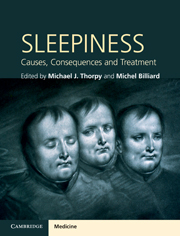Book contents
- Sleepiness
- Sleepiness
- Copyright page
- Contents
- Contributors
- Foreword
- Preface
- Abbreviations
- Section 1 Introduction
- Section 2 Sleep Disorders and Excessive Sleepiness
- Section 3 Medical, Psychiatric and Neurological Causes Of Sleepiness
- Section 4 Therapy of Excessive Sleepiness
- Chapter 35 Amphetamines, methylphenidate and excessive sleepiness
- Chapter 36 Modafinil/armodafinil in the treatment of excessive daytime sleepiness
- Chapter 37 Sodium oxybate for the treatment of excessive sleepiness
- Chapter 38 Caffeine and other alerting agents
- Chapter 39 Histamine receptor (H3R) antagonists, hypocretin agonists, and other novel alerting agents
- Chapter 40 Behavioral and psychiatric treatments for sleepiness
- Index
Chapter 39 - Histamine receptor (H3R) antagonists, hypocretin agonists, and other novel alerting agents
from Section 4 - Therapy of Excessive Sleepiness
Published online by Cambridge University Press: 04 February 2011
- Sleepiness
- Sleepiness
- Copyright page
- Contents
- Contributors
- Foreword
- Preface
- Abbreviations
- Section 1 Introduction
- Section 2 Sleep Disorders and Excessive Sleepiness
- Section 3 Medical, Psychiatric and Neurological Causes Of Sleepiness
- Section 4 Therapy of Excessive Sleepiness
- Chapter 35 Amphetamines, methylphenidate and excessive sleepiness
- Chapter 36 Modafinil/armodafinil in the treatment of excessive daytime sleepiness
- Chapter 37 Sodium oxybate for the treatment of excessive sleepiness
- Chapter 38 Caffeine and other alerting agents
- Chapter 39 Histamine receptor (H3R) antagonists, hypocretin agonists, and other novel alerting agents
- Chapter 40 Behavioral and psychiatric treatments for sleepiness
- Index
Summary
Keywords
- Type
- Chapter
- Information
- SleepinessCauses, Consequences and Treatment, pp. 444 - 451Publisher: Cambridge University PressPrint publication year: 2011



